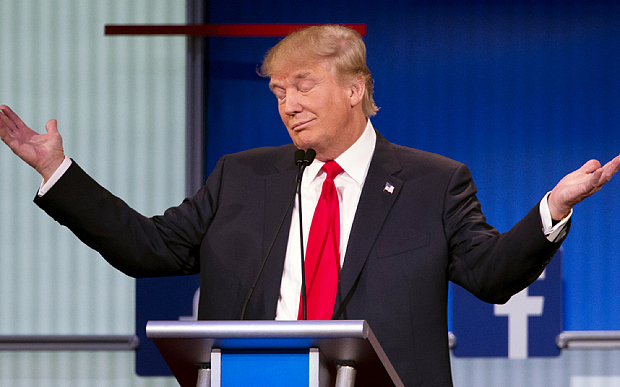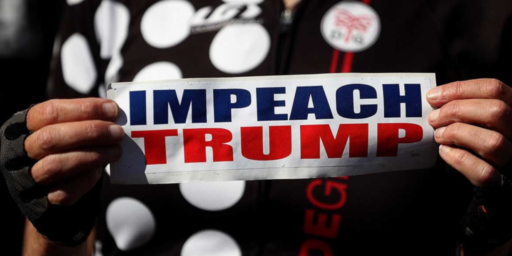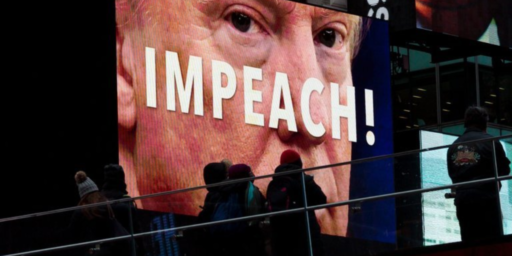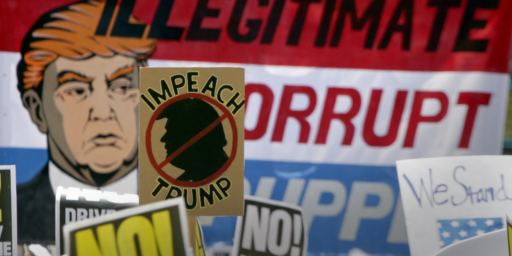Our Constitutional Crisis
To defang impeachment is an invitation for presidents to ignore the rule of law.

How long would it take for the U.S. military to engage in a successful military coup?
I’m no expert on such matters but I suspect that if a resolved American military sought to seize control of our governing branches, it would take about, oh, eight minutes–or however long it takes to send a squadron of Abrams tanks and Bradley Fighting Vehicles down Pennsylvania and Constitution Avenues. In other words, it would be quick and easy.
If so, what in our Constitution prevents military coups? After all, military coups are common events all over the world. What’s so special about our U.S. Constitution that prevents military coups, and why don’t other nations incorporate this feature into their own constitutions?
Here’s the truth: the Constitution has nothing, or very little, to do with preventing military coups. At the end of the day the decisive factor that prevents military coups in the United States is the military itself. The American military and especially its leadership are deeply indoctrinated into the conviction that military authority is subordinate to elected civilian rule. The democratic convictions and culture of the military, not an institutional trick of the Constitution, is what keeps us safe from danger along that front.
One might similarly ask, what stops presidents from routinely ignoring Supreme Court rulings? Andrew Jackson and Abraham Lincoln famously ignored Supreme Court rulings, but those events are noted because of their rarity. Again, the truth: The Supreme Court has no way of enforcing its own rulings. Those fancy black judicial robes hearken back to venerated days of old but they do not confer super powers. The Court operates effectively only when the executive branch effectively voluntarily complies with the Court’s rulings.
In 1957 when Arkansas Governor Orval Faubus ordered the Arkansas National guard to block school integration, President Eisenhower—the former Supreme Commander of the European Theater who in WWII directed American troops to fight against Nazis—felt compelled to order American troops to confront the Arkansas National guard and angry white citizens. Eisenhower personally was opposed to school desegregation, but having taken the oath of office, President Eisenhower set aside his racism and he enforced the law as he understood it.
What President Eisenhower did was honorable, but it was also simply what needs to be done in a republic.
In short, the Constitution is not self-executing.
We are tempted to think of the Constitution as a “machine that would go of itself.” Merely wind up ambitious and self-interested office seekers, place them in well-designed institutions strategically pitted against one another and, voila, the public’s rights are protected, good policies are guaranteed, thoughtful deliberation is articulated, and the democratic process is ensured.
It is certainly true that interbranch institutional conflict is normal and normalized in our constitutional system. Conflict is built into our system, but it is well to remember that the same author, James Madison, who said that “ambition must be made to counteract ambition” also said that “The aim of every political constitution ought to be, first to obtain for rulers men who possess most wisdom to discern, and most virtue to pursue, the common good of the society.”
Despite our temptation to think of the Constitution as self-executing, the success of our republican regimes requires republican citizens and republican elected officials who love their republic and who are willing, at least at certain moments and under certain conditions, to set aside partisan advantage or self-interested gain for the public good. It requires more than legal compliance but also a commitment to a host of democratic values.
Constitutional brinkmanship—narrowly staying within the letter of the law while transgressing established standards of decency and democratic values—does not bring a republic to its knees immediately, but over time it chips away at the perception that our political system is fair and legitimate.
The success of our republic obligates the citizenry and our government to adhere to unwritten democratic norms. That’s because political legitimacy—the glue that holds our system together–is like the value of a nation’s currency. Currency holds value only when we believe it does. When we lose faith in our currency it becomes no more valuable than Monopoly money. When we believe in our party or tribe more than we believe in our elections—or in other democratic norms and institutions—we have left the realm of democratic politics.
Constitutional brinkmanship is not new (Newt Gingrich was a master of it), but Donald Trump and the GOP more generally have accelerated its usage and normalized it to an alarming degree. For example, consider Trump’s ongoing obsession with unsubstantiated voter fraud. During the 2016 campaign candidate Trump said that he may not accept the election results if he were to lose. Nothing remotely like that has been uttered by any candidate in American politics with whom I’m familiar outside of the fateful election of 1860. This flouting of norms was simply unprecedented. After the election Trump questioned the popular vote and made false claims of voter fraud that his own investigative team dismissed. When elections actually are corrupt or rigged, then republican rule is broken. On the other hand, making unsubstantiated claims about voter fraud or rigged elections is as morally reprehensible as actually rigging an election because it takes a normal piece of functioning democracy and makes it appear illegitimate, throwing into question the legitimacy of democracy itself. Making such false claims is like flooding the market with counterfeit currency.
Trump’s GOP has taken a similarly cynical approach with respect to the impeachment process. Impeachment is an important check on executive power. It is an explicitly constitutional measure that crucially protects the public. Impeachment is a vital defense against executive or judicial overreach or abuse that seeks to uphold not only laws and the constitutional text but also essential democratic norms and practices.
The Constitution is notably sparse in its treatment of impeachment, which therefore places greater stress on the widespread adherence to democratic norms to ensure its legitimacy.
But isn’t that a hopelessly naïve expectation? We all know by now that impeachment is inherently political and even partisan. Why expect self-interested partisans from behaving like anything but self-interested partisans?
It’s a good question, and it seems at times as if the better angels of our nature have flown away. Certainly politics is not for the faint of heart, and partisan politics is often nasty and brutish. It’s always hard fought, and it should be. That’s how citizens are given meaningful choices. But even in the thick of our political wrangling, legitimate democratic politics would have us view our partisan rivals as opponents, not mortal enemies. When we come to believe that what’s good for our party is identical to what is good for the country, we enter into dangerous territory.
All impeachment talk is partisan and bruising and unpleasant and uncomfortable. But that doesn’t make impeachment a constitutional crisis. On the whole, in fact, impeachments are not constitutional crises. What I mean by constitutional crisis, taking my cue from Princeton professor Keith Whittington, is a kind of glitch or breakdown in the practice of governance for which the Constitution provides insufficient means of remedying. In our history, we’ve had thus far two bona fide constitutional crises—the crisis of the Constitutional Convention of 1787 in which we abandoned the Articles of Confederation in favor of the U.S. Constitution; and second, the Civil War. We’ve had other events that stopped just short of being full-on constitutional crises: the election of 1800; the impeachment of Andrew Johnson; the election of 1876; FDR’s Court-packing scheme; and the 2000 election. Each of these crises were resolved by some sort of compromise or act of capitulation. Someone backed down.
Nixon’s crisis as President was not a constitutional crisis. The Constitution worked as it should. Bill Clinton’s impeachment was not a constitutional crisis. Even had he been removed—as perhaps he should have been—it would not have been a crisis.
What we are experiencing in Trump’s impeachment, however, is arguably a bona fide Constitutional crisis.
Why do I believe this?
American Government 101 reminds us that fundamentally (i.e. constitutionally) it is up to the House of Representatives, not the President, to determine the rules for the House’s impeachment inquiry proceedings. It is not a trial (holding the trial is the role of the Senate) but some practices of due process not stated in the Constitution have become custom. And those practices were largely met by the House. Certainly the investigation proceeded more favorably for Trump than for President Andrew Johnson, for whom Congress first voted a resolution of impeachment and only subsequently chose to draft specific articles against him.
President Trump’s response to the House’s impeachment demands for documents and witnesses is a classic example of brinkmanship if not out-and-out constitutional violation. President Trump’s lawyer Pat Cippollone stated
“President Trump and his Administration cannot participate in your partisan and unconstitutional (impeachment) inquiry under these circumstances. You simply cannot expect to rely on oversight authority to gather information for an unauthorized impeachment inquiry that conflicts with all historical precedent and rides roughshod over due process and the separation of powers.”
With this letter we entered a constitutional crisis. The Constitutional crisis is not about Ukraine or corruption or the Bidens or quid pro quos. Reasonable people disagree about their gravity. President Trump’s letter, on the other hand, is new—and it’s very troubling. The trouble becomes even more disturbing when one learns that the President has been in close collaboration with the Senate’s GOP leadership to map out a strategy for the ongoing Senate trial—a gross violation both of separation of powers and the constitutional standard of an impartial Senate trial.
The President does not have the authority to define for the House either its impeachment powers or its oversight authority. The President has no standing to require the House to vote for an impeachment inquiry or to demand the grounds for due process. It’s not up to the president to dictate the process. The president cannot determine who gets to ask questions. Nor does the President have the authority to collaborate with the Senate majority party to establish rules for a trial rigged for victory rather designed to elicit the impartial presentation of evidence and arguments. The Constitution here is unambiguous.
In contrast, the President does have the authority:
- To appeal to the public that he is being treated unfairly.
- To claim executive privilege for specific congressional requests of information—and such claims would then be fought out both in congress and in the courts.
- To make his case during the Senate trial that the House’s articles of impeachment are colossal mistakes.
- To ask the people to punish the Democrats at the ballot box.
What he does not have a right to do is announce that he need not comply with the constitutional powers of the House of Representatives and the Senate.
The Constitution is not a self-executing machine. It requires voluntary compliance to both the letter of the law and its attendant democratic values. If a President is permitted to reject out of hand the constitutional powers of the House of Representatives and the Senate, ask yourself:
- Why would he feel compelled to honor the Senate’s judgment of conviction and removal?
- Why would he feel the need to honor a judgment of the Supreme Court?
- Why would he need to honor the results of the 2020 election?
Recall that President Trump promised ahead of the 2016 election that he would not accept the election results. He said, quote, “I’ll keep you in suspense.”
A constitutional system should not be kept in suspense.
To be fair, impeachment, like any power, can be abused and used for ill. Its legitimacy, beyond its constitutionality, depends upon more than adherence to the constitutional text. Is it possible that the Democrats have also acted contrary to democratic norms during the impeachment inquiries and trial? Let’s briefly examine three GOP charges lobbed against Democrats.
First, the GOP has argued that Nancy Pelosi’s strategy of temporarily withholding the articles of impeachment was an act of constitutional brinkmanship. Here I believe the GOP is fundamentally correct. However, the force of the argument is drastically weakened by the simple facts that Pelosi’s actions did not affect the substance of the impeachment charges nor was the delay inordinately long.
Second, GOP members return time and again to the claim that any impeachment without bipartisan support is illegitimate. If impeachment charges were sufficiently strong and supported by evidence, they intimate, they would have garnered support across the aisle. This charge entails several fallacies. First, it ignores how the House’s impeachment inquiries were drastically impeded by the GOP itself. Trump’s blanket refusal to comply with House subpoenas for documents and witnesses made it impossible in some cases for the House to corroborate the claims of second-hand witnesses. To use this regrettable dearth of documents and first-hand witnesses as evidence of Trump’s innocence instead of as prima facie evidence of his desire for a cover-up is ludicrous, even staggering in its audacity. This charge also presupposes that the GOP would be willing to convict Trump if the evidence warrants it. No evidence supports such an assumption, and much evidence refutes it. And lastly it assumes that partisan support is a single-party decision, not a reflection of two parties engaged in political tactics. Indeed the GOP is revealing a dangerous new tactic for any future impeachment inquiry—form a perfect firewall around one’s president, then accuse the other side of partisanship and subsequently of illegitimacy. It’s diabolically clever.
Lastly, the GOP holds that the impeachment is illegitimate because it overturns the election results of the people. This, too, is a weak argument, even setting aside that “the people” voted for Hillary Clinton and that Vice President Pence, not Hillary Clinton, would assume the presidency were Trump removed from office. It’s a weak argument for two reasons. First, it suggests that one natural consequence of the impeachment process is somehow illegitimate if not unconstitutional. It should go without saying that any time the Senate removes an impeached elected official that it overturns an election result; far from being a glitch, this is the fulfillment of impeachment’s constitutional purpose. Second, the argument fails to recognize that part of the charge against Trump is his attempt to interfere with the legitimate democratic process. Waiting for the people to decide Trump’s fate in the 2020 election means possibly leaving in office an elected official who has sought to rig the rules of the election in his favor. Whether this should be so is precisely what is in question in the impeachment articles.
A thorny problem associated with polarized toxic partisanship is that too many people feel as if losing elections means losing everything. And if everything is at stake, then defending oneself at any cost seems perfectly legitimate. Today we see the Republicans engaged in this kind of “the only thing that matters is winning” behavior brazenly and shamelessly. Sadly I know of no reason to hope that Democrats will necessarily behave differently going forward. After all, they’re learning what works. This poses a troubling prospect. For forty years the United States was in a Cold War with the Soviet Union. My fear is that we run the risk of possibly entering an era of a domestic cold war in which the contestants will do anything, and break any rule, to win.
This is the problem with our broken impeachment process. When a President is allowed (with complicity from his party) to determine the rules of his own impeachment inquiry and impeachment trial, our most powerful congressional tool for keeping oppressive presidents in line is rendered impotent. To defang impeachment is all but an invitation for presidents to ignore the rule of law. And if that happens, we may discover sooner than we would otherwise dare contemplate just how long it takes for our U.S. military to engage in a successful military coup.




“Trump’s blanket refusal to comply with House subpoenas for documents and witnesses made it impossible in some cases for the House to corroborate the claims of second-hand witnesses. To use this regrettable dearth of documents and first-hand witnesses as evidence of Trump’s innocence instead of as prima facie evidence of his desire for a cover-up is ludicrous, even staggering in its audacity.”
This. 1,000 times, THIS. And if you try pointing that out to a Trump fan, they default to “partisan witch hunt”.
You and another guy in a room, no one else. You shoot the other guy and when the cops show up you say, “Hey, it’s just his word against mine, and he ain’t talking.” To which the entire GOP jury nods sagely and says, “Well, he’s got a point.”
@Michael Reynolds: You’ve nicely summarized how stand your ground laws work, and many police shootings.
The American people would also reject a military coup. We have a strong belief in our democracy and institutions. There is a belief that even if the other side won, we will someday win, and that the elections were fair, and that allows us to accept defeat.
Unless, of course, we start noticing that we are frequently getting presidents elected without a plurality of the vote, and that erodes our confidence in our democracy.
Excellent column. We rely on norms, and under Trump and the GOP, they have failed us.
Well certainly that process has already started…and notice in recent history that it is exclusively Republicans who have gained the presidency without a plurality of the vote, just as it exclusively Republicans who are currently enabling this constitutional crisis…
If moderators could release my comment from moderation, thank you…I wonder why it was even placed in moderation…
@An Interested Party: The system works in mysterious ways at times.
@Gustopher:
I don’t believe that any more. I used to. I believe a very large segment of the electorate would support a coup – left or right – if the coup served their interests.
I believe the GOP is leading us down a dangerous path.
When will Republicans show a backbone? Does remaining in the Senate mean that much to these people that they would throw away their dignity? Their self-respect? And to kowtow to a buffoon like Trump…how humiliating…
@Gustopher:
@EddieInCA:
I believe that Eddie is closer to the truth on the acceptability of a coup. There is a revanchist swath of our body politic that sees a military takeover as benefiting them at the expense of the other.
@Michael Bailey interesting analysis. Put OTB on your calendar for a post, say, once a week.
I may have been the one to first suggest a coup. I want to make clear what I mean:
I don’t suggest the armed forces would stage a coup, regardless of who wins in November.
the possibility I see is that Trump loses in November, refuses to accept it, and mobilizes the GOP and his base to resist handing over power. That would be, in effect, a coup by Trump and the Republican party, and that’s where the armed forces could get involved. Then it’s important which side they pick.
A rough analogy would be Napoleon when he overthrew the Directory in a coup, as he was one of the Directors in office. Or Fujimori’s dissolution of the Peruvian Congress in 1992.
These are very rough analogies, as it’s very unusual for those in power to execute a coup of any sort. After all, they already hold power. Still, both Napoleon and Fujimori had support from the military.
And Trump is a gnat compared to these two, or less than that compared to Napoleon. It’s far more likely he’ll tweet about his desire that someone do something, rather than organize and execute a coup himself (try saying that with a straight face).
This is the ongoing cycle of our history: the country enters a period of unity where there is a broad consesus on how society is organized which leads to strong institutions with a lot of power over the individual. Over time, the flaws in this consensus begin to become apparent, leading to a loss of faith that weakens the institutions and empowers individuals. However, the empowered individuals become incapable of working together, precipitating a crisis. During the crisis, a new consensus is reached empowering new institutions and the cycle begins anew.
The last broad consensus was the one formed after the Great Depression. What we are seeing now is the crisis that resulted from the breakdown of that consensus as various factions compete to impose their vision of what the new consensus will be, and none of them have the support of enough of society to become that “national consensus”.
This state will not last; the country will eventually be reborn as it was after the revolution, the civil war, and the great depression.
@Kathy:
If Tiny loses a close election, expecting him to go to Twitter in order to gather support for remaining in office, may fall into the likely category. While he will have support from his RW base and we can expect them to come out with guns blazing, this includes some office holders particularly in congress, it is doubtful that he has the institutional support from the bureaucracy, the military, the 1% and importantly among Repub governors.
When a President is allowed (with complicity from his party) to determine the rules of his own impeachment inquiry and impeachment trial, our most powerful congressional tool for keeping oppressive presidents in line is rendered impotent.
This is just dumb. The idea that a President must instantly and meekly comply with any and all demands made by an impeachment inquiry is stupid on legal, political, moral, ethical, and practical grounds. When Congress wants information and the White House doesn’t want to give it, whether during impeachment or literally any other circumstance, the universally accepted next step has been to let the courts decide who prevails. In this case it is the Democrats and not Trump who is short-circuiting the normal process.
@CardieG:
His blanket refusal to cooperate is a significant deviation from past practices.
…the universally accepted next step has been to let the courts decide who prevails.
This is only the third successful impeachment of the President of the United States.
Considering that the United States Constitution states:
And after the President has been Impeached states:
Please note that the only mention of the Judiciary is not even in the Impeachment clause it is in the trial clause. Your claim of universal acceptance of something or other is nonsense and does not apply.
@CardieG:
My argument may yet be “just dumb,” but let’s be clear about what I’m arguing.
In my post I explicitly acknowledge that presidents may claim executive privilege and that courts have a role in the ordinary process. I say:
Courts recognize different levels of executive privilege based on their rationales, putting national security claims as most worthy of protection, and concern for quality advice as legitimate but of lesser concern. That Trump released a transcript of the call seems to nullify any national security grounds. But in any case that’s not the issue here. The issue here is that the President’s rationale not to participate in the oversight demands of Congress was not made on executive privilege. Instead he said that until Congress meets his demands for what impeachment should look like, he refuses to participate in the impeachment inquiry. Indeed he said how information would be forthcoming were Congress to comply–a statement that undercuts executive privilege altogether, it seems to me.
This is akin to Congress refusing to participate in a presidential veto, or a Court refusing to participate in a presidential pardon. It’s unconstitutional on its face.